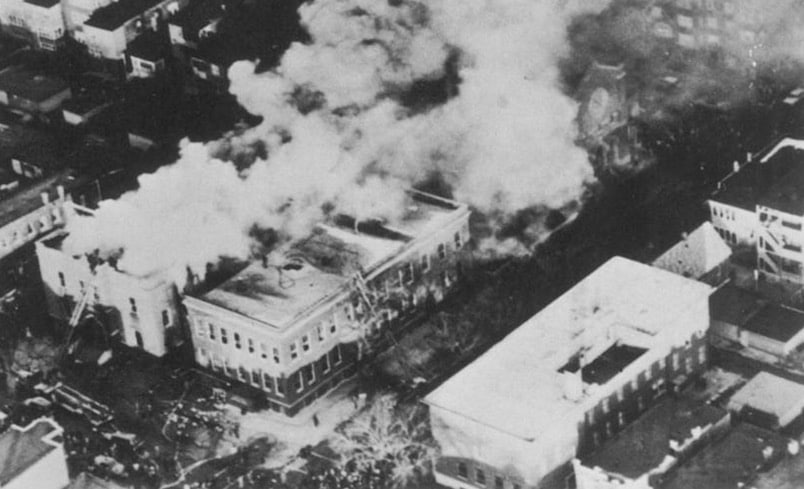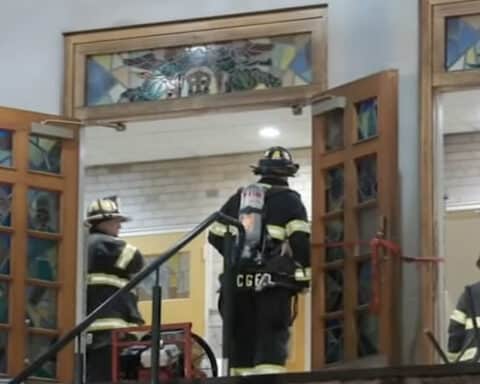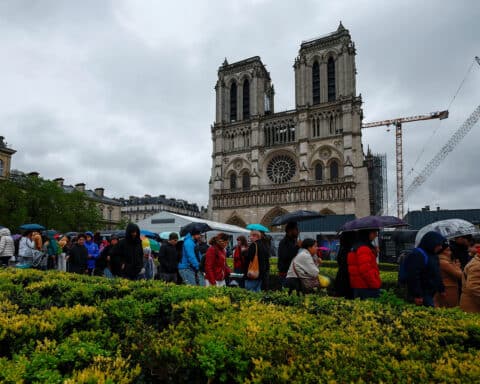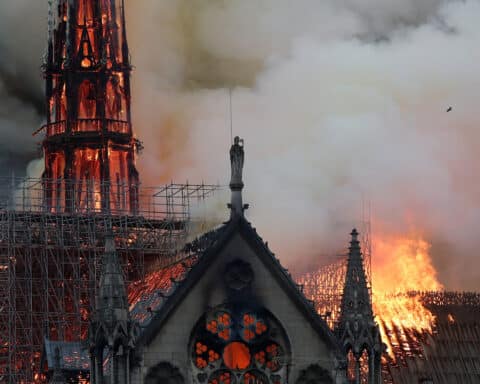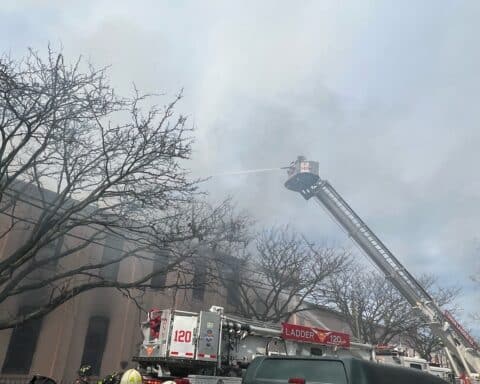Matt Plovanich will pause and pray on Dec. 1. Sixty years ago, he was among the 1,600 students and staff at Our Lady of the Angels grade school in Chicago when it became engulfed in flames.
“I don’t pray for the kids. I pray for the families. I know the kids are in a wonderful place,” said Plovanich, 70, a retired Chicago police detective.
That terrible day he was in “the Cheese Box,” the affectionate nickname for his fifth-grade classroom. The fire raged outside their classroom door, preventing escape. Their teacher, Sister Geraldita, had forgotten the key that could have opened the back door to the closet and fire escape. As the smoke grew dense, young Matt, after moments of panic, laid on the floor to accept the inevitable.
“I knew I was going to die,” he recalled. “I had a vision of our kitchen table with my parents and three brothers. Everybody had their heads bowed, and I knew how much they would miss me.”
Ninety-two students and three nuns died. Nearly 100 others were injured. With no escape route, some students jumped to their deaths from the second floor. The fire’s cause was never determined.
The parish was close-knit before the fire. Most of the students were from Italian families who came to America in the first half of the century. A new school was built. But it closed years later because of declining enrollment. Then, the parish closed, too.
Ten years ago, on the fire’s 50th anniversary, 1,600 survivors and others gathered for a special Mass at another church in Chicago. They now gather each year for a Mass. There is talk of chartering buses this year to visit their former church, now the site of a Franciscan mission serving the surrounding low-income neighborhood. On a grassy plot in front is a plaque with the names of the dead.
“We try not to let anyone walk there. That’s where some of the bodies were laid,” said a brown-robed nun from the mission.
Survivors stay in touch. They let one another know when someone dies or falls ill. They reminisce about their First Communion and recall a favorite teacher or classmate. They post grateful remembrances when a firefighter who responded to the fire passes away. One specific cherished memory is when the school won the highly competitive grade-school football championship for Catholic schools in the city the next year. The team broke the huddle with the chant: “For the 95.”
‘We’re all survivors’
Some survivors suffered emotionally for years. Families fell apart. Others fared better. Their faith bolstered them both during the ordeal and in the decades afterward.
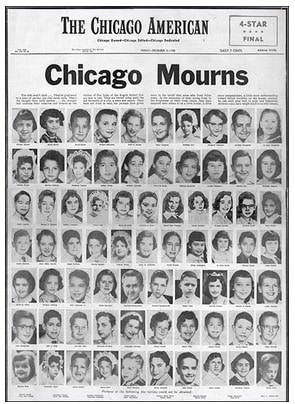
The bonds that tie grade school classmates are particularly tight for former Our Lady of the Angels students.
“There is a look in someone’s eyes [when meeting a former classmate],” said John Raymond, a fifth grader in 1958. “You don’t need to necessarily talk about it. We knew what we went through. You can feel it in the handshake.”
Raymond understands that hardly any student was not deeply affected. “We’re all survivors. We’re all victims,” he said. “There was one boy who didn’t go to school that day. He had been up late, and his father let him sleep in. Half his class didn’t make it. He had to think, what half would I have been in?”
Connie Rose Straube, also a fifth grader then, always has been careful about where she sits in public places.
“If I were in an unfamiliar restaurant, I looked for the exit. Once in a movie theater an usher led me to a seat next to the wall. How would I get out if there was a fire?” she said.
Still, unlike some of her classmates, she did not suffer from post-traumatic stress disorder. Not knowing better, most parents and teachers discouraged students from talking about the fire.
“My parents were very open about it. They encouraged me to talk about it. My friends and I shared our experiences,” she said.
Mary through the fire
That day, Straube was trapped in the Cheese Box, as well.
“I could hear the fire cracking the wood. I could see the orange haze,” she said. A Sister of Charity of the Blessed Virgin Mary, Sister Geraldita, told two or three of the larger boys to ram the locked back door with their shoulders. The door did not budge. The nun then told the prone students to cover their mouths and noses with cleaning cloths from a big metal cabinet in the back of the room. “I prayed to the Blessed Mother to spare me for my parent’s sake. I knew they could not cope with my death.”
Sister Geraldita instructed the children to pray the Rosary. “That was like our lighthouse,” said Plovanich. “It kept us from panicking.”
Unknown to the class, Father Charles Hund, a young associate pastor, and Jim Raymond, John’s father and the school’s janitor, were outside the locked back door. Minutes earlier, Sister Geraldita had told the children to throw a half-dozen plotted plants out the windows at the rectory. The loud thumps had alerted the housekeeper.
Besides Sister Geraldita, Straube, who was small and easily pushed aside, was the last one to escape the room, which burst into flames seconds later.
“It was a miracle no one in our classroom died. It was God’s will I lived. And the intercession of the Blessed Mother,” said Straube, who today lives 70 miles from Chicago on a farm with her husband.
Plovanich suffered from night terrors for years beginning when he was a teenager. He woke up with a dread of being trapped and, trying to escape, once shattered a window in his parents’ home. Another time he woke up to find himself out on a busy street near his home.
Plovanich worked undercover in narcotics. “I had a lot of close calls. My life was in jeopardy,” he said. “God gave me the strength to get through everything. I’m so glad I had the religious training I did.” He leveraged his experience for colleagues, informally counseling other officers to “not sweat the small stuff.”
The fire was “the defining moment of my life,” he said. “It’s strange to say, but I’m glad I experienced that.” His near-death experience has stayed with him his entire life.
“When I was sure I would die, I accepted that my body would be charred, but my spirit was alive. It was euphoria. I understood my body was a corpse, but my spirit lived on.”

